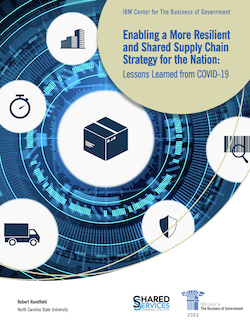
Enabling a More Resilient and Shared Supply Chain Strategy for the Nation: Lessons Learned from COVID-19

Blog Co-Author: John Marshall, Founder and CEO, Shared Services Leadership Coalition
Many government programs, including several top priorities of the Biden-Harris administration, can be conceived as supply chains for the production and distribution of goods, services, data, funds, and other public benefits. The national response to the COVID pandemic involved hundreds of federal, state, local, and private sector entities in the exchange and distribution of information, personal protective equipment, testing, and vaccine administration.
The president’s FY 2023 budget request to Congress focuses significant attention and investment proposals on strengthening supply chain operations and improving supply chain risk management and resiliency. The execution of these programs can be transformed by leveraging a “whole of government” scope and industry-leading supply chain management and shared services business models to their delivery.
In this report, author Robert Handfield—a leading global supply chain expert and professor at North Carolina State University—outlines how a modern supply chain strategy can leverage shared service models to increase efficiency and productivity. The author coalesces significant insights to address whole of government supply chain and shared service challenges, using the COVID-19 experience as a proxy and drawing conclusions for larger process, technology, and policy strategies. Among these observations was the tremendous problem-solving capacity coming from networked individuals who step outside assigned roles to bring their collective talent to bear on urgent problems facing the country—addressing what has been learned for how to prepare for the next pandemic, as well as other whole of government management challenges.
The report identifies several pathways for addressing these challenges, which include:
- Improved transparency and information sharing
- Data standardization and interoperability
- Machine learning tools to enhance these capabilities
- Governance for national initiatives and ownership of key assets like stockpiles
Professor Handfield draws on lessons from an IBM hosted roundtable event, which framed key features of a future state that would leverage industry leading supply chain and shared services business practices to enable world-class whole of government response capabilities. The report also highlights and a set of practical and actionable recommendations for government to close the gaps that exist today and move towards a more responsive and shared supply chain.



